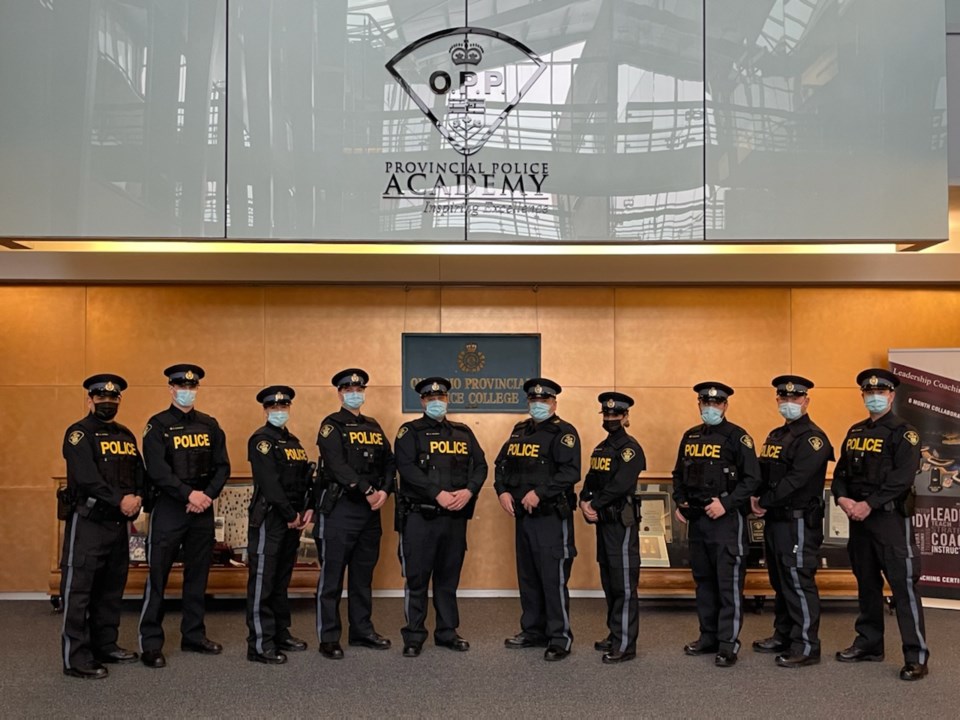DRYDEN – Community engagement is an essential key to breaking down barriers. One such barrier is the stigma that police services are in place only to arrest, detain, and punish criminals.
However, the largest part of policing is a proactive approach to crime prevention rather than a response to criminals actively.
An increased police presence in one’s community shows they are engaged in making the street a better place by spreading awareness of safety and well-being.
This is why Const. Ron Fults and Const. Brittany Bembeneck from the Dryden and Ignace Community Server and Engagement Unit are taking a proactive approach to serve and protect our neighbourhoods.
Their role with the community is to create meaningful partnerships with local community services to maintain the well-being of the public.
One such way is regularly corresponding with the Dryden Regional Health Centre Mobile Crisis Unit to assist with mental health and addiction.
“We discuss how the police and the mobile crisis unit can work together in a more proactive way to support the individual who is struggling with their addictions or mental health,” said Bembeneck. “We’ve gone to a hybrid insert model with our detachment. We’ve selected five officers every shift. We’re calling them the lead mental health workers,” explained Bembeneck.
This can be done in a variety of ways. When police respond to a call with an individual struggling with mental health and addiction, they’ll have the Mobile Crisis Unit either accompany them and in certain cases handle the situation or guild the officer with resourceful ways to provide the individual with adequate help.
In some cases, less fortunate individuals struggle to survive while suffering from mental health and addiction. And with an added barrier to obtaining affordable housing, the difficulties of maintaining a healthy lifestyle result in criminal activity.
By building a partnership with organizations like Kenora District Service Board, OPP’s Community Service Unit can guild the individual to a support system.
“If we are at a call service or we are dealing with someone on a daily basis, I am able to say, “Hey, what can we do to help you? Who can we put you in contact with and provide you with some support that you need,”” said Bembeneck.
Community engagement officers can do more than just reprimand an individual. They are partnered with outside agencies to ensure that these individuals have access to social support systems that will actively get them the help they need.
Another proactive approach to servicing the community is informing the youths of the pitfalls of misinformation on social media and targeted bullying both online and offline.
Fults explained, “I meet with the schools. I speak with the principals, vice principals, and staff to try and see what their needs are and what they would like to see as a result to engage with the students.”
For example, Fults tours the school promoting social media safety, bicycle safety, and bullying. These are some of the more prominent concerns for school-age children.
Social media safety has become increasingly more important these days as social media has been integrated into everyday life.
“We talk about what’s safe on social media, what’s acceptable, what’s inappropriate. We talk about how people can be caught or scammed like catfishing. How people can be tricked into providing too much information,” said Fults.
One example Fults highlighted is the suicide of Amanda Todd, who in Oct. 2012 took her life after she was blackmailed into exposing her upper private parts via webcam to a 35-year-old male who posted the photos on Facebook, resulting onslaught of school bullying and cyberbullying attacks against Todd.
Todd would then publicly tell her story on social media before taking her life.
“They are trying to get the students to understand that social media is not safe if you don’t know what to look for,” said Fults.
It’s essential for authority figures like the OPP, Schools, and social services to work together in spreading awareness of the dangers and disadvantages that happen within the community.
By doing so, people like Bombeneck and Fults are creating a strong bonder within the neighbourhoods they serve and protect to ensure that everybody has the support they need to live safe and healthy.
